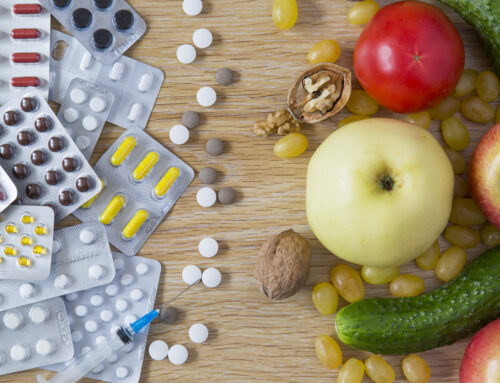Food Fact and Fiction (Part I)
by Reisha Zang
Sorting food fact and fiction can be difficult. What foods are really good for you? What should you avoid? Dr. Tina Marcantel is a naturopathic doctor practicing in Gold Canyon, Arizona. Other East Valley cities she serves are Gilbert, Mesa, Chandler, Tempe, Scottsdale, Queen Creek, Apache Junction, and the greater Phoenix area. Reisha Zang is a contributing writer to Lifestyle magazine.
(This article first appeared in Northeast Mesa Lifestyle magazine, January 2007 edition. Excerpts from the article are published here by permission of the author.)
Beef or chicken? Red wine or white wine? Would you like fries with that? These are all questions that used to be so easy to answer. A quick check of our tastebuds at that moment and the decision was made. However, today it seems like all the food we enjoy is bad for us. Just listen to your mother, next-door neighbor or co-worker; everyone has advice on what to eat and what not to eat. New research surfaces every day about the benefits and drawbacks of different foods. In reality, some of the foods we think should be forbidden might not be all that bad.
Go fish?
There has been a lot of talk about fish in the news recently. Though it offers many benefits, there are warnings about certain types of fish. The concern stems from the amount of mercury found in some fish. The ADA cautions that we should consume less
swordfish, shark and kink mackerel and warns pregnant and nursing women and young children to avoid these fish. Chunk light tuna has less mercury than albacore, so it is a better choice for everyone. The ADA also says that fish provides a lot of health benefits. For example, it helps promote heart health and aids in the prevention of heart disease. Dr. Tina Marcantel, a naturopathic physician in Mesa, likes fish oil for helping brain function and says it can even improve memory. Fish has so much to offer and should definitely become part of your health regimen.
Got milk?
…Is it true that a warm glass of milk will help you fall asleep quicker? Dr. Marcantel is not so certain that milk itself will put you to sleep, but thinks there might be a psychological calming effect. While milk does contain tryptophan, the same amino acid found in turkey, there is not enough to make most people fall asleep.
Marcantel said, “The tryptophan turns into serotonin, which turns into melatonin, which makes people calm.” However, she said, “You would need to drink an awful lot of milk or
eat a whole bunch of turkey in order for it to make a difference.” A routine at bedtime with a nice comforting beverage might help you fall asleep. Marcantel suggests a calming chamomile and hops tea.
Wine and dine?
Now that you have selected your entrée, should you avoid that glass of wine? Recent studies show that drinking wine, red or white, may offer heart-healthy benefits. Melinda
Johnson, a local spokesperson for the American Dietetic Association (ADA), said, “A glass of wine a day probably does benefit your health. Red wine seems to be a favorite, but white wine and dark beer can also be beneficial.” The ADA reports that substances in grapes, such as resveratrol and tannins found in the skin and seeds, may influence cholesterol. There is some indication that the alcohol offers benefits as well. However, Johnson cautioned, “The jury is still out on what type of alcohol is best if you are going to have a drink a day.” She is concerned because there is not enough evidence out there for someone to start drinking if they currently don’t.
Chicken soup for the soul?
Occasionally, no matter what we eat, we still get sick and turn to food to make us better. Chicken soup is grandmother’s favorite for curing a nasty cold. However, contrary to
popular belief, Amy Pendergraft, consulting dietician for the Arizona Spine and Joint Hospital in Mesa, says that there is not much nutritionally in chicken soup that will make you feel better. “It is a bland, simple food that is easy to tolerate if you are not feeling well,” she said, which is a good thing.But don’t underestimate the thought. She says if someone made it for you, like your mom, and you find the warmth comforting, the psychological benefit can make it physical. Marcantel agrees, but warns to stay away from canned soup and start from scratch with a real chicken. When we are sick, it is important to keep hydrated and soup can help, she said. The protein from the chicken is also good for you. It might make you feel better, but chicken soup is not cure-all.
Indulge late night cravings?
Is it bad to have a little snack with that cup of tea before going to bed? Many people say that eating after 8 p.m. will make you gain weight and believe overall that snacking is not a good idea. Actually the American Dietetic Association (ADA) believes that snacks have a bad reputation. The right foods in the right portions can make good snacks that can curb your appetite or increase your energy. Fruit, low fat cheese or apples with peanut butter are all healthy options.
An apple a day keeps the doctor away, right? “It’s going to take more than an apple,” said Marcantel. Not that an apple is bad for you. There are a lot of great things about apples, such as fiber in the skin and good vitamins. The darker the skin, the better; it will have more vitamins and antioxidants. But an apple alone won’t do it. She stated, “It is going to take exercise and a variety of nutritional foods on a consistent basis, but there is nothing wrong with an apple.”
The important thing to remember is that it isn’t when you are eating, but how much you are eating. Weight gain occurs whenever you eat beyond your hunger, said Johnson. Which is why eating at night can be a bad idea. “We usually don’t have time to overeat during the day,” she said, “but at night it is easy to over consume.” Especially if you are snacking in front of the television or reading the paper and not paying attention to what you are eating.






